A change to UK legislation in September 2021 implemented by the Department for Transport (DoT) brought about the introduction of Ethanol blended petrol at UK filling stations.
Petrol now comprises up to 10% Ethanol. Hand pumps are labelled either Petrol E10 or E5 with the declared octane level, usually 95 for Unleaded or 97 or above for Super or Premium grade unleaded ethanol blended petrol.
But did you know that MGOC Spares has been supplying E10-compliant fuel system components since well before this date? In fact, all our hoses, fuel tanks, fuel pumps and carburettor components have been E10 compliant since January 2012.
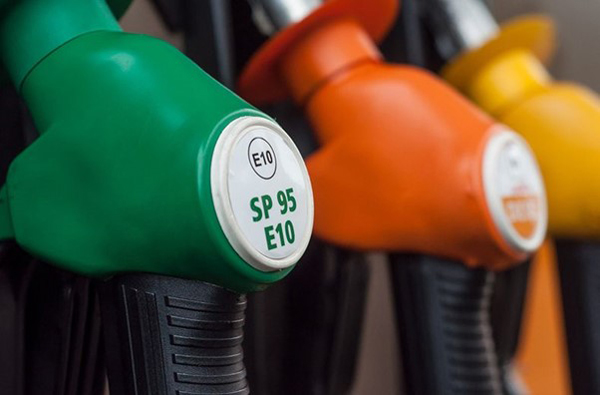 Image courtesy of RAC website
Image courtesy of RAC website
As we might expect, the recent changes to Ethanol blended petrol at the fuel pump has generated considerable discussion amongst classic vehicle owners, so for your assurance we thought it might be helpful to share some information to help owners avoid some of the associated engine running and fuel supply problems which might be encountered.
Are our Fuel Hoses suitable for E10?
The fuel hose type and material specification can be found printed on the side of our fuel hoses (except for braided fuel hoses which are the same hose specification but covered by the outer braid).
For reliability and consistency, we stock quality E10 compliant Cohline branded fuel hose manufactured in Germany of type 2192 to DIN 73379-2a for 1/4" & 5/16" internal diameter, offered in either braided or un-braided form.
Whilst Cohline can be relied upon to meet the declared standard printed on the side of their hoses, this is not the case for all fuel hose which might be printed with an appropriate test standard suggesting compliance with E10 ethanol blended petrol, but we are aware of examples failing prematurely, with hoses cracking or crumbling and clogging up the fuel system. In our view it is in the interest of the owner to choose quality branded fuel hoses from a trusted supplier.
Our experience over the last 10+ years helps reinforce our ongoing supply of our fuel hoses which are consistent in terms of quality and reliability; and for your assurance we are pleased to say that we have no documented premature failures of our E10 compliant hoses since their introduction.
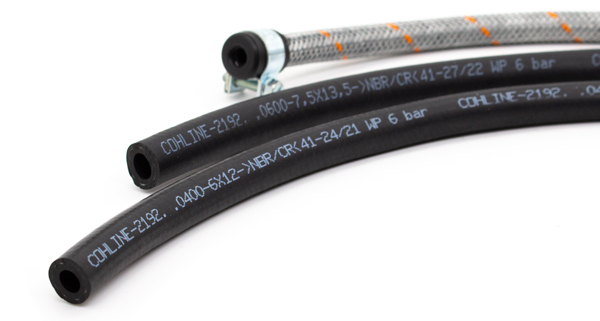 Cohline fuel hoses of type 2192 to DIN 73379-2a
Cohline fuel hoses of type 2192 to DIN 73379-2a
What problems can arise from using Ethanol Blended-Petrol for the classic MG owner?
Ethanol blended petrol isn’t suitable for older vehicles as the ethanol component within the blend, absorbs moisture leading to corrosion, becomes acidic and burns at a lower temperature than petrol causing non-injection engines to run hotter.
Ethanol is hygroscopic, attracting moisture from the air. Water is soluble with ethanol, but does not mix with petrol, so after a few weeks will drop to the bottom of the fuel tank taking some of the ethanol with it – this process is known as Partial Phase Separation.
This leads to corrosion within the fuel system which might be detected by tea stained fuel within the fuel filter (where fitted) or blockages from rust debris within the fuel pump and/or carburettor fuel bowls. The effect of corrosion can be accelerated by Ethanol’s ability to become acidic on contact with the air forming a mild carbonic acid with a PH of 5.6.
Problems are not only limited to reduction in the service life of the fuel delivery system but additionally, the acidification of the fuel can cause excessive cylinder wear within the engine and additionally, for injection cars the injectors and fuel pump may fail prematurely.
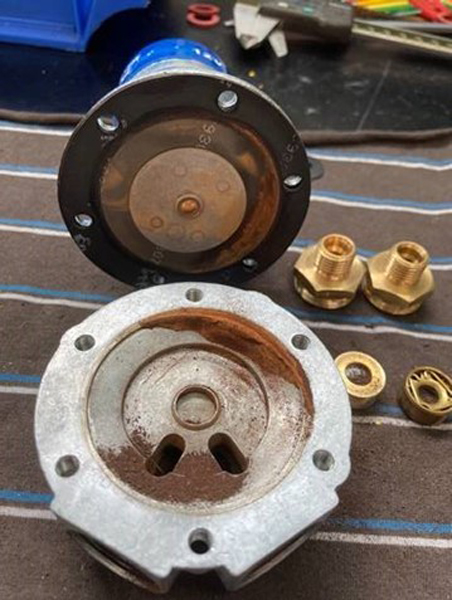 Corroded fuel pump
Corroded fuel pump
How does this work?
Injected cars can adjust their fuel mixtures on the go using sensors to monitor the mass of air entering the engine, as well as the amount of oxygen in the exhaust (for cars from 1992 onwards). The ECU uses this information to fine-tune the fuel delivery so that the air-to-fuel ratio is just right.
This means that the engine performance of fuel injected cars is not affected to the same extent as non-injected cars, which have fixed fuel delivery and are unable to adjust their air-to-fuel mixture on the go. Ethanol molecules include oxygen atoms, whereas petrol doesn’t. That's part of the reason why ethanol has a lower calorific energy value than petrol.
Another effect of the oxygen from ethanol is that ethanol blended petrol tends to lead to leaner running engines than those which run on petrol because there is more oxygen available in the fuel-air mixture.
In the case of MGs with carburettors the engine is not able to compensate by reducing the incoming airflow, resulting in less-than-ideal combustion conditions in the engine cylinders. Unless richer needles are installed within the carburettor to compensate for the leaner fuel due to the ethanol content, hotter running will be encountered.
Owners of classic MGs using ethanol blended petrol in the UK might experience reduced performance, requiring higher RPMs in lower gears before they achieve cruising speeds, elevated temperatures at the temperature gauge, more regular switching on of the electrically operated fans (where fitted), cleaner looking spark plug electrodes and reduced fuel economy.
The extent to which these problems are experienced depends on whether 95 E10 or Premium Unleaded E5 is used with E5 Premium Unleaded performing better.
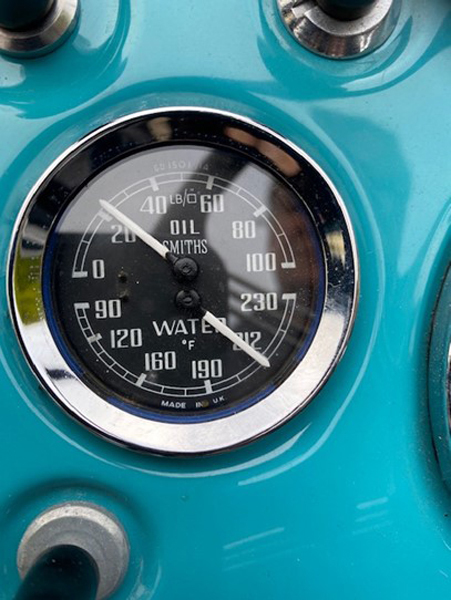 MGA with high water temperature and low oil pressure
MGA with high water temperature and low oil pressure
What Ethanol Blended-Petrol should you use?
Did you know that the recommended fuel within the driver’s handbook for classic MGs was 4 Star petrol which had a 98 Octane?
On this basis, owners of classic MGs should fill with 97+ E5 (referred to as Super or Premium Unleaded) which currently contains up to 5% ethanol with the Octane varying from 97-99, depending on the supplier, and not 95 E10 (referred to as Unleaded) which does not deliver the required octane demanded by the engine resulting in sub-standard performance.
Using Premium Unleaded E5 offers improved performance and reliability with increased range, reduced running temperatures, longer storage and reduced corrosion effects when compared to 95 E10.
In our experience, the benefits of using 97+ E5 (Super or Premium Unleaded) far outweigh the cost savings made by filling with cheaper 95 E10.
Not forgetting of course that your MG is your pride & joy, so why not treat it to the best?! Did you know that currently, Esso Synergy Supreme+ 99 is ethanol free in some parts of the UK?
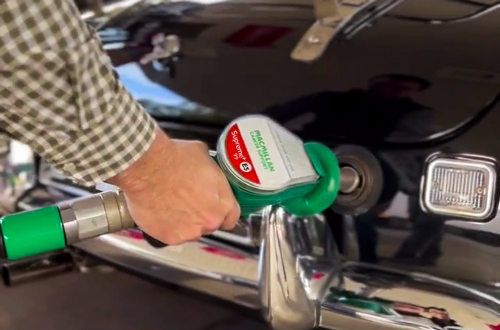 Fill up your classic with E5 every time!
Fill up your classic with E5 every time!
How do I protect my engine and fuel system including hoses from the harmful effects of Ethanol?
First, you should check that your fuel hoses are rated to E10 specification and that they are not showing any signs of cracking or deterioration. As we’ve outlined above, we recommend that you fill your classic MG with Premium Unleaded E5.
For additional peace of mind, we recommend adding a fuel additive; such as Valvemaster Plus for classic MGs or Etha-Guard for early 90s MGs fitted with catalytic converters but which are not E10 compliant.
Using specialist fuel additives to combat the harmful effects of ethanol blended petrol will further extend the stability of the fuel, improving shelf-life/storage, and reduce acidity and corrosion within the fuel system.
What's more Valvemaster Plus and Etha-Guard both include a friction modifier for improved combustion, economy, and performance. Visit Classic Valvemaster for more information.
You can also check out our blog on UK fuel changes and video on the benefits of using a quality fuel additive to guard against the adverse effects of Ethanol within your class MGs fuel system.
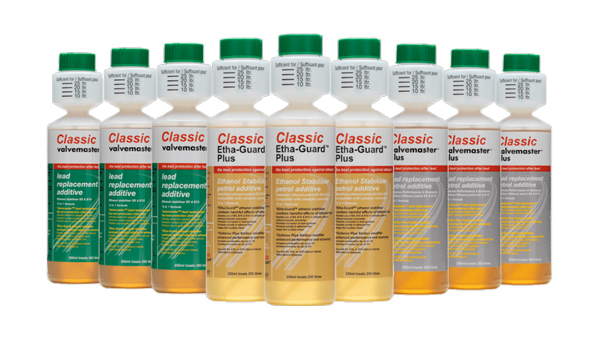 Castrol Classic Oils range of fuel additives
Castrol Classic Oils range of fuel additives
What about my other Cars & Motorbike?
If you’re not sure whether your vehicle can use E10 petrol, visit gov.uk website where you can check compatibility by vehicle manufacturer.
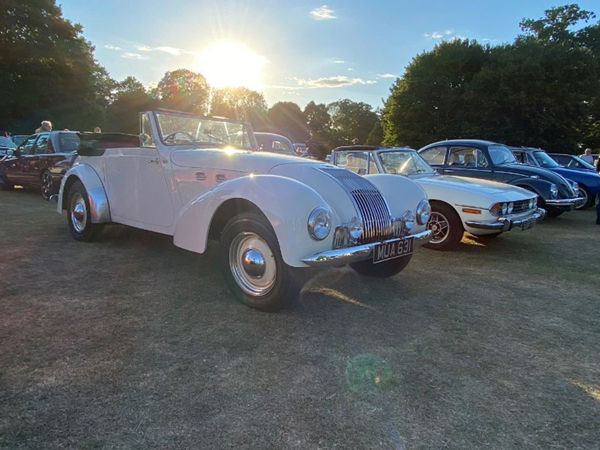 Classic car show at Ickwell, Bedfordshire
Classic car show at Ickwell, Bedfordshire
What are the benefits of using E10 Blended Petrol?
We all have our part to play in working towards lower Greenhouse Gas (GHG) emissions. The UK Government have targeted nett zero decarbonising target by 2050.
It has been estimated by the Department of Transport (DoT) that using ethanol blended petrol will reduce CO2 emissions within the UK by 750,000 tonnes, equivalent to removing 350,000 cars from the road (for more information see rac.co.uk ).
For the moment, we believe the adverse impacts to classic vehicle motoring from the switch to ethanol blended petrol within the UK, are manageable if owners follow the guidance (see above).
At this time, there are no planned increases in ethanol content within blended petrol, with the DoT due to undertake an impact assessment in January 2025. The UK Government have said that ‘a number of vehicles that are not approved for use with E10, as well as machinery and other petrol-powered equipment, will remain in use for the foreseeable future’.
The RAC estimates that there are approximately 600,000 vehicles on UK roads which are not compatible with E10, equating to less than 2% of all vehicles on UK roads today. The rationale for maintaining super/premium grade petrol at only 5% ethanol content is likely to remain given that sales of E5 fuels account for only 5% of all UK petrol sales.
With relatively low demand for super/premium grade fuels, a good proportion of which will be used within classic vehicles covering only limited miles per year, increasing the ethanol content above 5% within super/premium grade fuels would likely return only a minimal reduction in GHG and is therefore, unlikely to take place.
Having supported MG owners for over 40 years, MGOC Spares will be here to help you adjust to any changes so you can continue to enjoy the thrill of MG motoring into the future.
Ethanol-Blended Petrol FAQs
What are the advantages of using ethanol blended-petrol?
Using ethanol blended-petrol has the potential to reduce Greenhouse Gas emissions when compared with using conventional petrol. Ethanol production is also more carbon efficient than petroleum refineries and demands less energy in comparison, meaning fewer fossil fuels are burned during the process.
Which is better for classic cars: E10 or E5 Fuel?
As only cars manufactured after 2002 are generally thought to be E10-ready, it's best to stick with E5 fuel for any classic car. You can be sure that you’re getting the best protection for your engine by using Premium Unleaded E5 as opposed to filling up with cheaper 95 E10.
What should I do if I accidentally fill my classic MG with 95 E10?
The RAC has produced guidance on the use of E10 blended petrol. Their fuel spokesman, Simon Williams comments: “Owners of classic cars need to be particularly careful not to accidentally fill up with E10 and then leave it sat in the tank for long periods, as this will likely lead to expensive damaged seals, plastics and metals.
But people who fill up a non-compliant car with E10 don’t need to panic. They shouldn’t suffer any lasting damage to their vehicle as long as they put the correct fuel in as soon as possible – when around a third to half the tank is used. While using up the fuel they may, however, experience a little poor cold starting and rough running.”
Please Note: The information provided in this blog is intended as a general guide only. While we aim to ensure accuracy, classic vehicles can vary, and procedures may differ depending on model and condition. Always consult your vehicle’s official workshop manual before carrying out any work. If in doubt, seek the services of a qualified professional.
© 2025 MGOC Spares Ltd. All rights reserved.
This blog and its contents are the intellectual property of MGOC Spares Ltd and may not be copied, reproduced, or republished without prior written permission.
For author enquiries, corrections, or reproduction requests, please contact: blog@mgocspares.co.uk
Who are MGOC Spares?
At MGOC Spares, we provide dedicated parts and accessories for classic MG vehicles, including the MGB, Midget, MGC and many more.
With thousands of products in stock, we are your one-stop shop for all your classic car needs. Our wealth of expertise means that you can trust us to find the right part for your classic MG vehicle – whatever it may be.
Need support finding the right parts for your MG? Contact us today, we're happy to help!